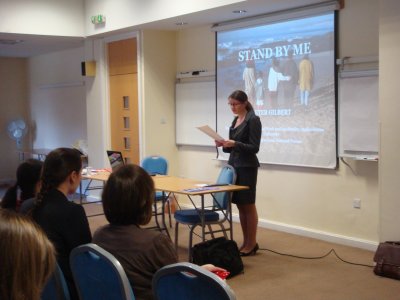Catholic Medical Quarterly Volume 62(3) August 2012 p46-47
Reports
A Light Shining in the Darkness.
Adrian Treloar
 Congratulations
to Leeds branch for a wonderful well attended annual CMA
symposium.
Congratulations
to Leeds branch for a wonderful well attended annual CMA
symposium.
Spiritual care is central to what we do in health and brings
many benefits, with better outcomes in health care and huge
appreciation for what is offered. As Sr Margaret said: “in
an NHS that is so short of money how odd that we do not value
the thing that is so often freely given”.
Professor Gilbert reminded us that good spiritual care leads to:-
- Improved self-control, self-esteem and confidence
- Recovery, facilitated both by promoting the healthy grieving of loss and through maximising personal potential
- Relationships being improved – with self, others and with God
- A sense of meaning, resulting in renewed hope and peace of mind, enabling people to accept and live with their problems [1]
But that list omits what is perhaps the most fundamental benefit of all. We must remember that the possibility that God exists is far from disproven. Therefore, we cannot forget that spiritual care may provide a channel of concrete, transforming grace which either brings benefits in this life, or (sometimes) salvation in the next. Also, as Trish Gale told us, confession brings, for some people, profound and hugely effective opportunities to support a return to health from significant mental illnesses.
Add to the list of benefits of spiritual care therefore
- A possible channel of transforming, saving and concrete grace through prayer and the sacraments.
What is the light that is switched on inside us? For me, the central light is hope. The work that we do in health care is to make people more whole [ref]. We do not always cure, but for those we cannot cure, spiritual care and enabling that combination of hope and understanding as we die is truly transforming. Even in non lethal illness, the illnesses our patients suffer may trigger values realignments that transform the way people live.
We cannot forget that the interaction between mental health and spiritual health is often complex. For example, depression erodes and destroys hope with an astonishing thoroughness. Pravin Thevathasan pointed out that there is a real (and complex) interplay between mental health and spiritual health. Prayer, grace and the sacraments can be of great help as we try to draw people towards health. It is therefore perfectly reasonable for clinicians to take a spiritual history in a tactful way. Often enough, the work we do forms people towards wholeness, rather than implanting a sudden spiritual cure for which they are not ready. And mental health brings with it significant stigma and discrimination. p>
SoSo shining that light for our patients is a tricky challenge. While we cannot impose our faith, we cannot accept (and thereby impose) the absence of spiritual care and spiritual support for our patients and yet, spiritual care is really important and brings real opportunities. To deliver that care requires skills and tact. It may also be a duty [2].
Sadly, we cannot summarize a remarkable day of learning and reflection for those who were not there. We have asked for articles on what they said and so this is but a reflection. And look forward to next year’s symposium. Watch the CMQ for further announcements.
References
- Culliford L. (2002) Spiritual care and psychiatric treatment: an introduction. Advances in Psychiatric Treatment 8: 249-258
- Do I have a DUTY to arrange for my patients to receive Communion and Sacraments for the dying? Catholic Medical Quarterly Volume 61(3) August 2011, 36-7.
